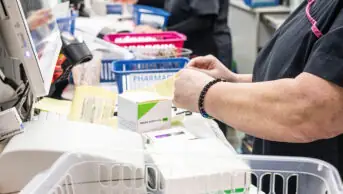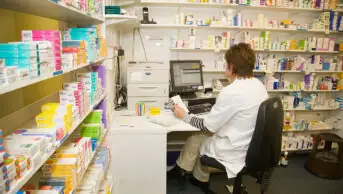
Shutterstock.com
MPharm students will be able to dispense medicines, investigate medication errors and administer immunisations to patients under new guidance drawn up to produce more hands-on training for pharmacy undergraduates.
The University of Bath was commissioned by NHS England and the Pharmacy Schools Council (PhSC) to produce a list of 47 entrustable professional activities (EPAs) that MPharm students can undertake during undergraduate clinical placements while supervised.
In May 2022, The Pharmaceutical Journal reported that pharmacy students might start taking on tasks involved in the supply of medicines during their clinical placements as part of an ongoing overhaul of pharmacy education and training.
The change follows the announcement that undergraduate pharmacy clinical placements were eligible for funding from the Education and Training Tariff for England from September 2022.
It meant that hospital trusts, community pharmacies, general practice and primary care networks providing MPharm placements of at least one week in duration would receive nationally standardised funding.
Since then, NHS England and the PhSC have been working to develop a continuum of education between the MPharm and foundation training year, which included exploring how training activities could be developed in clinical placements during the MPharm.
Supporting information, published with the list of the 47 EPAs on the PhSC website on 14 July 2023, says that MPharm students will not be expected to carry out all the activities on the list, and it will be for individual schools of pharmacy and placement providers to decide which training activities they offer.
“There is no requirement for all schools of pharmacy to adopt or utilise EPAs within their placement provision,” it says.
“Schools of pharmacy will be working closely with their placement providers to develop placement models that work for them.”
Joseph Oakley, head of assessment and credentialing at the Royal Pharmaceutical Society, said the new guidance would “encourage a more hands-on approach” for pharmacy undergraduate students.
“The development of this list of core activities will help maximise the contribution pharmacy undergraduate students can bring on placement to both patients and the system,” he said.
“This evidence-based approach balances the development of autonomous practice and proportionate supervision to ensure learning support and patient safety, and will help HEIs [higher education institutions] and employers design and deliver a consistent learning experience for all students.
“These activities could form a useful passport between experiential providers and students, by tailoring the learning to the student’s specific needs in terms of supervision.”
Further guidance in the form of a toolkit will be published later in 2023.
2 comments
You must be logged in to post a comment.



How about EPAs for newly qualified independent prescribers??
I'm not clear how they differ from competencies? There are competencies for NMPs...